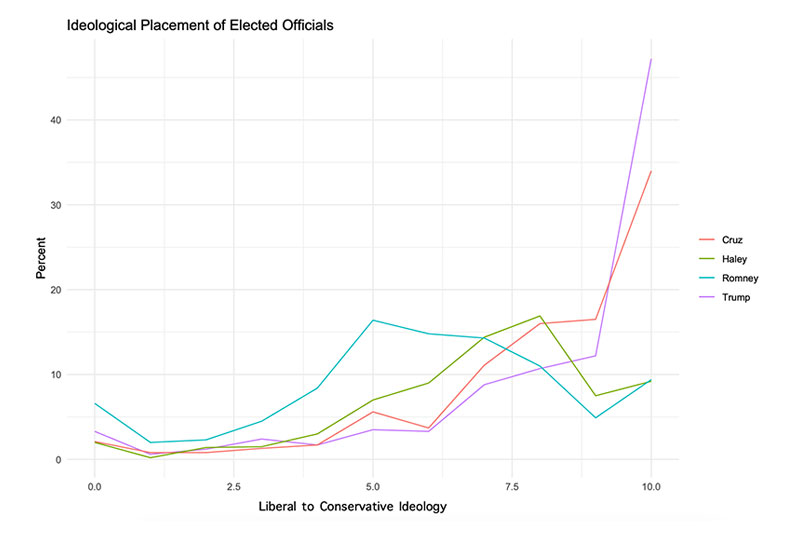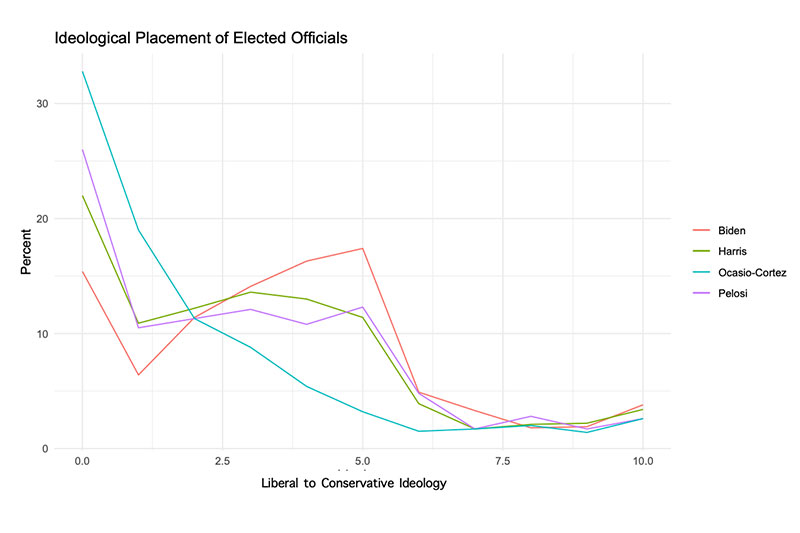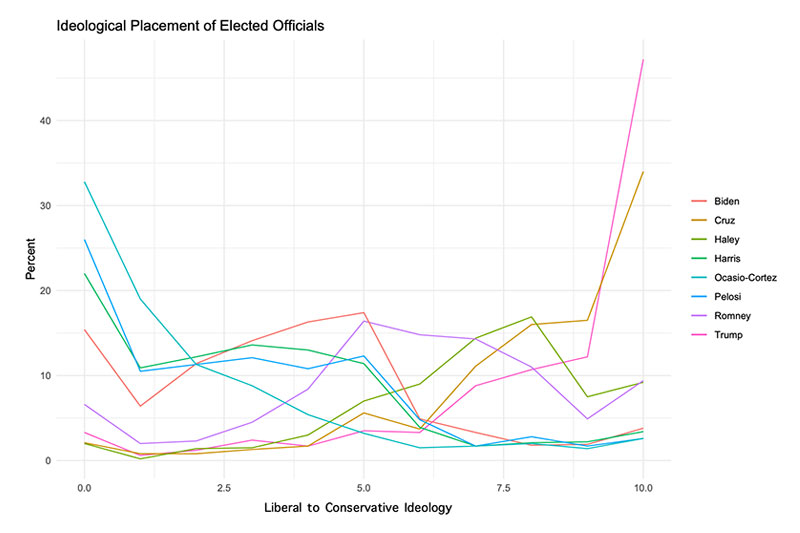2021 Virginia Ideology Report
"Virginia voters are ideologically moderate overall, but largely support Democratic policy proposals"
Summary of Key Findings
- Virginia voters are ideologically moderate, leaning conservative. Asked to place themselves on a 0-10 scale (liberal to conservative), Virginia voters average score was 5.83. Republicans average self-score was 8.11, Democrats 3.57, and independents 5.72.
- Voters overall place the Democratic Party at 3.03, on the liberal side of the scale. Democrats see their party as more moderate (4.00); Republicans see the Democratic Party as even more liberal (1.47); and independents place the Democratic Party at 3.30, on average. Voters overall place the Republican Party at 7.45. Democrats see the Republican Party as more conservative at 8.23; Republicans see their party as slightly more moderate at 7.11; and independents rate the Republican Party at 7.29.
- Virginia voters on the whole view Republican elected officials as more conservative than they view Democratic elected officials as liberal. For Virginia voters, former president Donald Trump represents the conservative wing of Republicans and Senator Mitt Romney represents the moderate wing, while President Joe Biden represents the moderate wing of Democrats and Congresswoman Alexandria Ocasio-Cortez represents the liberal wing.
- On health care policy, a strong majority of Virginia voters overall support changes to U.S. policy, with the strongest support for a Medicare for all-that-want-it program (76%). Democrats overwhelmingly support Medicare for all-that-want-it (90%), while Republicans overwhelmingly support repealing Obamacare and replacing it with a new, unspecified program (75%).
- On immigration policy, a strong majority of Virginia voters overall (73%) support providing a pathway to citizenship for undocumented immigrants currently in the U.S. Republican voters strongly support additional spending on border security to prevent illegal immigration (94%), while Democrats equally strongly support paths to citizenship both for undocumented children known as “Dreamers” (91%) and for all immigrants now in the U.S. illegally (89%).
- On environmental policy, a strong majority of Virginia voters overall support renewable energy investments (82%). Republicans strongly support expanding offshore oil and gas drilling in U.S. waters (83%), which is opposed by both Democratic voters (72%) and independents (63%).
- On economic policy, Virginia voters rank problems vastly differently, depending on their partisan orientation. Democrats largely see unfairness in the economic system that favors the wealthy (93%). Republicans largely view over-regulation of the free market as interfering with growth (70%). A “wealth tax” that would impose a higher tax rate on income of more than $1 million a year finds strong support among Democrats (90%) and independents (73%), while Republican voters are evenly split (48% favor, 49% oppose).
Analysis
Summary: This survey assesses differences among Virginia voters on public policy issues and ideology, both between political parties and within parties. Overall, Virginia voters are ideologically moderate, with a slightly conservative lean, while their policy positions are more in line with Democratic proposals. This accords with political science research showing that Americans tend to be symbolically conservative, but operationally liberal. In other words, residents of the U.S. tend to self-identify as conservative and espouse overall conservative values associated with liberty or the desire for smaller government, but when asked about specific policy proposals, they tend to be supportive of government efforts to address a range of societal ills. Our survey results show that Virginia voters are overall more supportive of Democratic policy proposals on health care, immigration, the environment and the economy, but place themselves slightly conservative on an ideological scale. On most of the policy issues covered, the survey also reveals more divisions among self-identified Republicans (and ideological conservatives) than among self-identified Democrats (and ideological liberals).
Ideology of Virginia voters, the major political parties and key political figures: We asked Virginia voters to place themselves on an ideological scale from 0-10, with 0 being very liberal and 10 being very conservative (the center point is 5). Overall, voters are moderate with a slightly conservative lean, with an average ideology score of 5.83. Republicans, on average, self-place at 8.11 while Democrats self-place at 3.57. Independents are very close to the overall mean at 5.72.
When voters are asked to place the Democratic Party on the same 0-10 ideological scale, the average rating is 3.03. On average, Democrats see their party as more moderate (4.00), Republicans see the Democratic Party as considerably more liberal (1.47), and independents place the Democratic Party at 3.30. Virginia voters overall place the Republican Party at 7.45. On average, while Democrats see the Republican Party as slightly more conservative at 8.23, Republicans view their party as slightly more moderate at 7.11, and independents put the Republican Party at 7.29.
Virginia voters were asked to place Republican officials – including former president Donald Trump, Senator Ted Cruz, former U.N. Ambassador Nikki Haley, and Senator Mitt Romney – on the same 0-10 ideological scale. Overall, Trump is seen as the most conservative, with an average placement at 8.26, followed by Cruz at 8.09, Haley at 6.99 and Romney at 5.82. Nearly half of those surveyed placed Trump at 10, the most conservative point on the scale. A considerable number of voters perceive Senator Romney as very moderate.

Among Democratic elected officials -- including President Joe Biden, Vice President Kamala Harris, Rep. Alexandria Ocasio-Cortez and Speaker Nancy Pelosi -- Biden is perceived as the most moderate by Virginia voters, with an average ideology score of 3.57; a significant number of Virginia voters placed Biden at 5, the midpoint of the scale. Biden’s messaging during the campaign and while in office has been one of moderation and unity, which is reflected in these scores. Harris is perceived as slightly more liberal than Biden, with an average score of 3.02, followed by Pelosi (2.88) and Ocasio-Cortez (2.02), who is viewed as the most liberal of the four. Just over 57% of those surveyed placed Ocasio-Cortez’s ideology at 0 or 1, the most liberal points on the scale. Rep. Ocasio-Cortez has described herself as a Democratic Socialist who advocates for the Democratic Party to take more progressive stances on a range of issues.

Though these eight political figures are not entirely representative of either party, they do represent key factions, and the Virginia voters’ responses tell us something interesting about how some leaders of each party are ideologically perceived. For example, charted together, these Republicans place higher on the conservative end of the scale than these Democrats place on the liberal end. That makes it clear that Virginia voters view the Republicans as more conservative than they view the Democrats as more liberal.

Health Care Policy (Q17 A-D): A majority of Virginia voters support changes to U.S. health care policy, with the strongest support for a Medicare for all-that-want-it program (76%), followed by creation of a public option for health insurance (70%) and a repeal and replacement of the Affordable Care Act with an unspecified plan (51%). Virginians are split on a Medicare for all program that replaces private health insurance (48% oppose/strongly oppose to 47% support/strongly support).
Though majorities support a number of these health care policies, the overall numbers mask key differences between and within self-identified partisans. Democrats are more supportive of a public option (83%) compared to Republicans (56%). In addition, ideological divisions are present: Conservatives support/strongly support a public option for health care (65%), while strong conservatives overall do not (43% support/strongly support). Strong liberals show the highest levels of support for a public option (89% support/strongly support), while liberals show slightly less support in comparison (78% support/strongly support).
A Medicare for all-that-want-it program is supported by both Republicans and Democrats, though to varying degrees: 90% of Democrats support/strongly support this program compared to 61% of Republicans. Strong liberals show a greater intensity of support, with 46% strongly supporting the policy compared to 29% for liberals.
Opposition to a Medicare for all program that replaces private health insurance is highest among strong conservatives (78% oppose/strongly oppose). Strong liberals show the highest level of support (84% support/strongly support), reflecting the progressive wing of the party led by Sen. Bernie Sanders and Rep. Ocasio-Cortez. Liberals show support to a somewhat lesser degree (79% support/strongly support). Moderates show modest support (53% support/strongly support) for Medicare for all.
A proposal to repeal the Affordable Care Act (Obamacare) receives modest support from Virginia voters overall (51%), though what this plan would be replaced with is unspecified. Republicans are more supportive (75% support/strongly support) compared to Democrats (30% support/strongly support) and independents (41% support/strongly support). These differences align with how this issue has played out on the national stage. The Republican Party campaigned on a repeal of Obamacare for years leading up to the Trump administration, where repeal efforts ultimately failed after public outcry in the law’s defense.
Immigration Policy (Q21 A-D): A large majority of Virginia voters support/strongly support providing a pathway to citizenship for undocumented immigrants currently in the U.S. (73%), while an even larger majority support a pathway to citizenship for undocumented immigrants brought here as children (78%). Two-thirds (66%) of voters support/strongly support enhancing border security to prevent illegal immigration, while 49% support/strongly support placing stricter limits on legal immigration.
The most pronounced gaps in partisan differences are found in relation to stricter limits on legal immigration. Three-fourths (75%) of Republicans support/strongly support stricter limits compared to 27% of Democrats and 35% of independents. Strong conservatives show greater intensity of support for tighter limits on legal immigration than do conservatives (41% to 24% strongly support).
While majorities in both parties show support for providing undocumented immigrants a pathway to citizenship, there remains a considerable gap between Republicans, Democrats and independents. Democrats support/strongly support this policy (89%) compared to Republicans (55%) and independents (84%). On the more specific proposal for a pathway to citizenship for “Dreamers,” or children brought to this country illegally by their parents, Democrats (91%) show higher levels of support than Republicans (62%), while independents come closer to the view of Democrats (86% support/strongly support).
While Republicans are overwhelmingly behind additional spending to enhance border security (94%), only 42% of Democrats support such a proposal. Independents sit between, with 64% saying they support/strongly support increased spending on border security. Strong conservatives show the highest intensity (64% strongly support). A small number of liberals support/strongly support additional spending on border security (32%), and even fewer strong liberals support/strongly support that policy (19%).
Environmental and Energy Policy (Q25 A-D): On environmental issues, Virginia voters show greatest support for renewable energy investments (82%), while 65% support/strongly support a “Green New Deal” to address climate change by investing government funds in green jobs and infrastructure and 53% support/strongly support a carbon tax or cap-and-trade program to reduce carbon emissions. Half of Virginia voters (50%) support expanding offshore oil and gas drilling in U.S. waters, with 45% opposed.
Differences between Democrats and Republicans are clear across each of these proposals. On the Green New Deal, 92% of Democrats support/strongly support this proposal compared to 35% of Republicans and 68% of independents. Support/strong support comes from 75% of moderates, 95% of liberals and 97% of strong liberals. Strong conservatives are the most opposed, with 70% saying they support/strongly oppose the Green New Deal, along with 61% of conservatives. Intensity differences among supporters are apparent, as 72% of strong liberals say they strongly support the measure versus 54% of liberals.
Renewable energy investments are widely popular among Virginia voters overall (82%), with more modest partisan gaps in comparison to other policy issues. Democrats support/strongly support these investments at high levels (97%) compared to 66% of Republicans and 92% of independents.
Market-based climate mitigation measures, such as a carbon tax or cap-and-trade system, are somewhat less popular, with only a slight majority overall favoring such proposals (53% support/strongly support). The idea is popular among Democratic voters (77% support/strongly support), but generally opposed by Republicans (59% oppose/strongly oppose), while independents are closely divided (49% support/strongly support to 47% oppose/strongly oppose).
The environmental policy that receives the least support from voters overall is the expansion of offshore oil and gas drilling in U.S. waters (50% support/strongly support). This expansion is more popular among Republicans (83% support/strongly support) compared to 33% of independents and 24% of Democrats.
Economic Policy (Q29-31): On the economic issues we surveyed, Virginia voters overall indicate their highest support for a wealth tax proposal (69%), while 53% support increasing the federal minimum wage to $15 an hour. Assessing the U.S. economic system, voters are more concerned that the system favors the wealthy (61%) than that over-regulation of the free market interferes with growth (34%).
Self-identified Democrats are strongly behind increasing the federal minimum wage to $15 an hour (86% support/strongly support), as are independents (66% support/strongly support), while most Republicans oppose such a change (83% oppose/strongly oppose). Differences emerge between strong liberals and liberals on intensity; 64% of strong liberals say they strongly support a $15 minimum wage compared to 55% of liberals. Moderates overall support the proposal (61% support/strongly support). Notably, strong conservatives are slightly more supportive of the $15 minimum wage than conservatives (21% to 17%).
On economic issues, the division among Republican voters is clearest when considering a wealth tax on income above $1 million (48% support/strongly support to 49% oppose/strongly oppose). Democrats are more unified on this issue, with 90% indicating they support or strongly support such a tax, while independents also favor the proposal (73%).
Asked which is the bigger economic problem in this country, most Republican voters (70%) say over-regulation of the free market, while a strong majority of Democrats (93%) and independents (72%) say it is unfairness in the system that favors the wealthy. Some differences are also seen between conservatives and strong conservatives, with strong conservatives more likely to cite over-regulation as the bigger problem (60% to 72%).
How the survey was conducted:
The results of this poll are based on 1,003 interviews of registered Virginia voters, including 427 on landline and 576 on cell phone, conducted February 28- March 17, 2021. Percentages may not equal 100 due to rounding. The margin of error for the whole survey is +/-3.8% at the 95% level of confidence. This means that if 50% of respondents indicate a topline view on an issue, we can be 95% confident that the population’s view on that issue is somewhere between 46.2% and 53.8%. The margin of error for subgroups may be higher. All error margins have been adjusted to account for the survey’s design effect, which is 1.5 in this survey. The design effect is a factor representing the survey’s deviation from a simple random sample and takes into account decreases in precision due to sample design and weighting procedures. Sub-samples have a higher margin of error. In addition to sampling error, the other potential sources of error include non-response, question wording, and interviewer error. The response rate (AAPOR RRI Standard Definition) for the survey was 9%. Five callbacks were employed in the fielding process. Live calling was conducted by trained interviewers at the Wason Center for Civic Leadership Survey Research Lab at Christopher Newport University. The data reported here are weighted using an iterative weighting process on region, age, race, sex, and education to reflect as closely as possible the population of Virginia’s electorate.
For further information contact:
Dr. Rebecca Bromley-Trujillo, Research Lab Director
rebecca.bromleytrujillo@cnu.edu
Office: (757) 594-9140
Dr. Quentin Kidd, Director
qkidd@cnu.edu
Office: (757) 594-8499
Mobile: (757) 775-6932